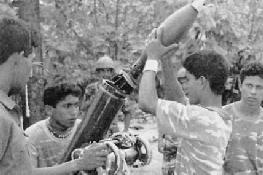





The Sri Lankan ethnic conflict was classi fied in an international news magazine as a “forgotten conflict.” That was around five years ago. Today, it must be a conflict that is in the sub-conscious..
Most conflicts of the nature of the ethnic crisis are of course long term projects. The Middle East will be living testimony to that. But the Middle East conflict has progressed through its attrition. There was a historic peace accord. People have been dying since then. But, probably with some hope.
In Sri Lanka, the deaths mount as the deadlock mounts. Though the Eastern province is the theatre of the killings now, it’s not so predictable where the next round of killings will be from.
The reasons behind the killings of pro-Sri Lankan Members of Parliament in the Eastern province could be twofold. On the one hand, the LTTE obviously wants to keep the temperature of the conflict at a reasonable high. The conflict may be forgotten, but it cannot be allowed to die altogether...
But the strategic factor is obviously different. All pro-Sri Lankan Tamil politicians have to be eliminated, the LTTE figures, because the impending devolution package will institutionalise new political devices in the North and the East which could be detrimental to its campaign.
This strategy of course means that the hot political issue that the government trots out at all possible opportunities, is actually rendered irrelevant.
It is not any longer a moot point that the LTTE won’t have anything to do with the devolution package. That’s accepted. But what will the current spate of killings that have been spawned in the East do? It will severely dent the state’s theory that the package will make the LTTE irrelevant.
The LTTE wants to ensure that the package will be made irrelevant instead. That’s why the political killings in the East are from all sides of the political divide; which means the message is clear. All those politicians who support the status quo will run the risk of being eliminated.
The political fallout of all these gory doings is something that has to be stated in no uncertain terms. This conflict will not be solved even if the governing party succeeds in ramming the political package through parliament.
This obviously means the war will go on, despite the political convulsions that will result from the implementation of the package.
It can be argued, (and it will be argued ) by the government that this is not a reason to cave in to the LTTE’s designs. The long-term strategy of alienating the LTTE politically will be taken to its logical conclusion with the implementation of the package. Or so it will be said by state spokespeople.
But political decisions are seldom taken on the basis of theoretical suppositions. Will the Sri Lankan government risk the promulgation of legislation which might create political havoc in the South and still not solve the problems in the North and the East?
All “forgotten conflicts’’ go through their phases, but some forgotten conflicts, it appears, are suddenly resurrected in the collective psyche of the world’s people because there had been a leap of faith. Though the conflict in the Middle East was by no means forgotten, its moribund character changed enormously with the peace accord.
But what caught the imagination of the world about the peace accord was its bi-partisan character.
The peace package contemplated by the Sri Lankan government does not possess that bi-partisan character, because it has clearly and expressly been repudiated by the LTTE. With that background, the chances of the package becoming a political dead letter (like the Indo-Lanka accord signed exactly ten years ago amid ecstatic expectations ) are quite high.
The interesting question, if one forgets the carnage for the moment, is whether the government calculates that this package will be the politically most expedient thing to do.
Let’s face it. This has not been the most idealistic of government’s in our times. Political expediency has been the credo of this dispensation, to a point where it is being seriously considered a virtue. The way the raucous cry for the abolition of the Executive Presidency was jettisoned, (sidestepped actually), is a good example of the values to which this government accords priority. That is said dispassionately, because maybe these leaders seriously believe that political expediency is better for nation building than idealism....!
So, having weighed the strengths of the accord on the political balance, there is every chance that this government will not seriously think of pushing this political package through parliament.
If you look at the short history of this package (dispassionately again) it is easy to ascertain that the package has bought the government party both political mileage and time. It has given the government international credibility as the kind of leadership that is serious about addressing the legitimate grievances of the Tamil minority.
But the government has displayed some of its characteristic temperament in the task of making the package a political reality. There has been a great deal of “lead-time’’ allocated for public discussion of the package, and in this task too, the government has made it appear that this is all in the interests of educating the mind of the people about the political intentions of its leadership.
This, the government is saying, is not a package that will secretly foist a forced political settlement on the people. Hence, the lead-time has been portrayed a necessary and imperative exercise.
But this kind of political procrastination has served the government well. This regime has persecuted the war much better than the UNP did, and there can be very little argument on that.
Perhaps, the strategists of state now think that it is time to get serious about the package, because militarily the LTTE has been reduced to a shadow of its former strength.
But is it really the government’s true intention?
Hats off to the think-tanks behind this government, it has been successful in its political “duplicity” most of the time. The policymakers have been very adept at pursuing their political agenda, with a great deal of sleight of hand.
Rarely have they showed their hand in playing their cards. So, though the LTTE acts as if the government is determined to push this package, the LTTE could be doing it out of expediency of its own.
It’s one way of reacting to the army’s offensives, for the LTTE to take up the position that its campaign of political killing in the East is a rejoinder against the government’s political package. A package which it feels is repugnant to its political campaign for a separate state.
It’s a nice plank for the LTTE to sit on, because it gives the killings a modicum of political association. The LTTE wants to give the idea that the killings are not pure political massacre, but a necessary step in the way of an ethnic rebellion.
But the real reason for the killings maybe that the LTTE needs a political theatre, a momentary new stage to keep the violence on the boil — to keep the fight going on in the collective sub-conscious. It’s the way a war can be kept from dying. Like a package which can be kept from being born?
Go to Hulftsdorp Hill by Mudliyar
Return to the Editorial/Opinion contents page
